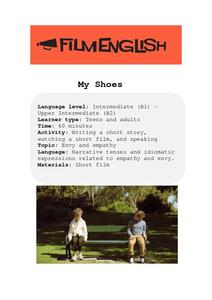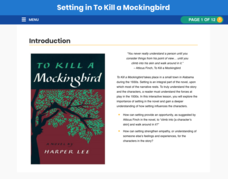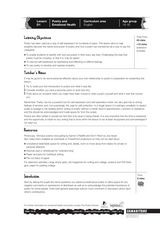Museum of Disability
Ian’s Walk and Apples for Cheyenne
Help young learners understand friendship and empathy with two reading comprehension lessons. Each lesson focuses on a story about a child with autism, and encourages readers to compare and contrast the characters to each other and to...
Nemours KidsHealth
Empathy: Grades K-2
Second graders read articles about being afraid, dealing with anger and apologizing. In this feelings lesson, 2nd graders read articles and discuss the feelings they have. Students describe their feelings and how to be supportive of each...
Curated OER
Chrysanthemum
Our uniqueness should be celebrated, not teased. The story Chrysanthemum addresses having a distinct name and dealing with different perceptions. Pre- and post-reading questions are listed to help your learners understand and make...
Curated OER
Teaching Empathy : The Story of Ruby Bridges
Learners explore "The Story of Ruby Bridges," by Robert Coles to uncover examples of courage in the lives of others and in themselves. This search into the story is meant to help students form connections with others and to foster the...
Film English
My Shoes
Engage your pupils in short story and short film. Using a still from the film as inspiration, pairs compose short stories, which they later share and compare with other members of the class. They then watch the film and respond to a...
Curated OER
Whale Song Acrostic
What do whales sing about? Invite your class to imagine the thoughts of whales before writing acrostic poems on the topic. The plan blends together a bit of life science with plenty of opportunities for creativity and writing.
PBS
Setting in To Kill a Mockingbird
Can you understand more about how a person acts by learning about how that person lives? An interactive resource explores the setting of Harper Lee's To Kill a Mockingbird with several slides discussing the location, social conditions,...
Curated OER
Look Out My Window. What Do You See?
Students explore William D. Huff's experience during Civil War as portrayed in his drawings, express empathy and demonstrate historical knowledge through creating their own artwork, and craft drawings and captions from perspectives of...
EngageNY
Grade 9 ELA Module 3, Unit 1, Lesson 1
Clear up the misconceptions about autism and individuals on the autism spectrum with an inquiry-based instructional activity. As ninth graders read the first four pages of Temple Grandin's Animals in Translation: Using the Mysteries of...
Curated OER
Problem Page Letter
Students discuss a dramatic situation involving realistic characters and create response "letters" to the situation in this Drama lesson for the high school classroom. The lesson emphasizes the study of empathy and sympathy as it relates...
Curated OER
Poetry and Emotional Health
Students explore self-expression through poetry. In this personal health lessons students read and discuss poetry regarding teen topics of interest. Students write poems, that express empathy.
Curated OER
Supporting Opinions: Handling the End of a Friendship
Four thought-provoking questions encourage readers to develop and support their opinions about strategies to end a friendship after exploring excerpts from a New York Times article. The reading is brief so this could be a lead-in to...
Curated OER
Lesson: From Time to Time
A portrait The Radcliffe Family circa 1742 is inspiration for creative writing and empathetic reasoning. Your class discusses the period in which the piece was painted, then imagines what life was like for one of the people seen in the...
Novelinks
The True Confessions of Charlotte Doyle: Writing Response
Prior to reading chapter 15 of the book, The True Confessions of Charlotte Doyle by Avi, examine the painting, Shipwrecked by Edward Moran, and respond to the feelings that arise within and how it relates to the characters of the novel.
Digital Public Library of America
Teaching Guide: Exploring To Kill a Mockingbird
Harper Lee's To Kill a Mockingbird, considered by many to be a seminal piece of American literature, contains many complex literary themes that carry through United States history. Use a series of discussion questions and classroom...
Museum of Disability
Stand Tall, Molly Lou Melon
Help to create the next generation of friends with a lesson about accepting people who are different. As kids read Stand Tall, Molly Lou Melon, they answer a series of discussion questions and activities about making friends with others.
Museum of Disability
Don't Call Me Special
Introduce young learners to the idea of disabilities and making friends with children who are different than they are. Using Don't Call Me Special - A First Look at Disability by Pat Thomas, learners are guided through the new vocabulary...
Museum of Disability
A Picture Book of Louis Braille
Teach kids about the beginnings of the Braille writing system with a lesson about Louis Braille. A series of discussion questions guide young readers though A Picture Book of Louis Braille by David A. Adler, and once they finish the...
Museum of Disability
Looking Out for Sarah
Perry the dog is Sarah's best friend and her guide to the visual world. Young readers learn about guide dogs and communication with Looking Out for Sarah by Glenna Lang, through a series of discussion questions and activities.
Museum of Disability
Taking Visual Impairment to School
What is the world like when you can't see, or when your vision is impaired? Learn about how Lisa communicates with the world around her with Taking Visual Impairment to School by Rita Whitman Steingold. Learners answer discussion...
Skills USA
Personal Growth and the Personal Leadership Inventory
What are employers looking for in prospective employees? Career-minded high schoolers examine their strongest technical skills as well as important 21st century skills, including leadership, empathy, clear communication, working well...
Curated OER
Health Education: An Integrated Approach; A Day Without Sight
Fourth graders hypothesize about the difficulties they may encounter if they did not have their sense of sight, in order to establish a sense of empathy for the disabled. In this instructional activity on senses, 4th graders record all...
Curated OER
What is reconciliation?
Tenth graders practice using empathy with an enemy. In this Current Events lesson, 10th graders prepare possible peace plans for Bosnia after the war. Students write a report on Nelson Mandela's use of reconciliation in South Africa.
Curated OER
Alexander and the Terrible, Horrible, No-Good, Very Bad Day
Second graders interact with the story of Alexander's horrible day by connecting it to their lives. They practice predicting, writing paragraphs, reading aloud, discussing his problems, making a card to cheer him up, and designing a pair...

























